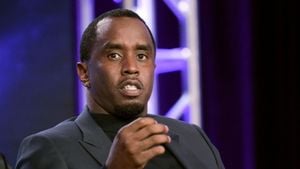The political climate of Uruguay underwent significant change as leftist candidate Yamandú Orsi emerged victorious in the presidential runoff election held on November 24, 2024. His win marks the return of the Broad Front (Frente Amplio), which previously held power for 15 years before being ousted by the conservative National Party led by Luis Lacalle Pou. Orsi’s election not only reflects the shifting sentiments of the Uruguayan electorate but also points to broader trends across the globe where incumbents are being challenged by opposition candidates.
Orsi, who is 57 years old, received 49.8% of the vote, defeating Álvaro Delgado of the National Party, who secured 45.9%. The election saw nearly 90% voter turnout, showcasing the strong civic engagement within Uruguay, which has compulsory voting laws. Delgado conceded defeat with grace, acknowledging the election outcome with sadness but stating, "We are not defeated."
After the election results came through, President Lacalle Pou extended his congratulations to Orsi and committed to facilitating a smooth transition. Orsi’s message following his victory was one of unity; he declared, “The country of liberty, equality, and fraternity has triumphed once again,” and emphasized the need to reach out to those who may not share his perspective. This call for dialogue marks his intent to govern inclusively, acknowledging the divided sentiments present within the nation post-election.
The Broad Front, which includes various leftist factions, has promised moderate reform rather than radical changes. During his campaign, Orsi focused on addressing pressing issues like childhood poverty, which has risen to concerning levels, along with increasing crime rates linked to new cocaine-smuggling routes passing through Uruguay. His platform aligns with continuity, similar to the previous tenure of the Broad Front, which is known for its market-friendly policies intertwined with welfare programs.
Orsi is hailed as the “political heir” to José Mujica, the former president known for his radical humility and progressive policies, including legalizing abortion and same-sex marriage during his administration. Mujica, now 89 years old, endorsed Orsi publicly, expressing confidence in his leadership potential. His exemplary governance and notable lifestyle changes transcended political ideologies and deeply influenced Uruguay’s leftist movements.
Despite Orsi’s moderate stance, the damaging ramifications of the pandemic and rising crime presented him with significant challenges. The outgoing administration faced rising criticism due to economic stagnation, stagnant wages, and concerns over the burgeoning crime rate, which have all haunted the National Party’s tenure. The heavy criticism leveled at the National Party for these issues played a key role in swaying the public’s vote away from Delgado.
Uruguay has enjoyed relatively low poverty rates when compared to its Latin American neighbors, currently sitting around 4%, thanks to former leftist administrations. Nonetheless, rising childhood poverty rates, currently at 25%, and aggravated crime rates pose the biggest hurdles for Orsi. He intends to tackle these issues by possibly increasing cooperation with European and international law enforcement agencies to combat the growing drug trafficking challenges affecting society.
Orsi's victory speech included calls for continued national dialogue, expressing his commitment to bridging divides among Uruguay's citizens. He stated his intent to build “a more integrated society and country,” indicating not only aspirations for unity but plans for progressive yet careful reform across key sectors such as security and agriculture.
Following the election, congratulations poured in from various political figures across Latin America, signalling regional support for Orsi’s administration. Leaders like Brazil’s Lula da Silva and Mexico’s Claudia Sheinbaum expressed shared goals of cooperation and strengthening partnerships between their countries and Uruguay. Amidst applause and cheers from supporters celebrating Orsi’s victory, it is clear this election holds substantial weight not only for Uruguayans but also for the political dynamics within the region.
The shift back to leftist leadership reflects how, much like elsewhere globally, voters are responding to frustrations with ruling parties amid socio-economic challenges. Critics have pointed out the National Party's inability to resonate with younger voters and its focus on fear-mongering over progressive solutions. This backdrop has catalyzed the Broad Front’s resurgence, placing Orsi at the helm of future changes for the nation.
Orsi’s presidency is set to officially commence on March 1, 2025, but the upcoming transition will undoubtedly shape the political discourse as Uruguay seeks to navigate its priorities moving forward. The hope is set high as the nation looks forward to Orsi's leadership following years marred by economic depression and social unrest.



